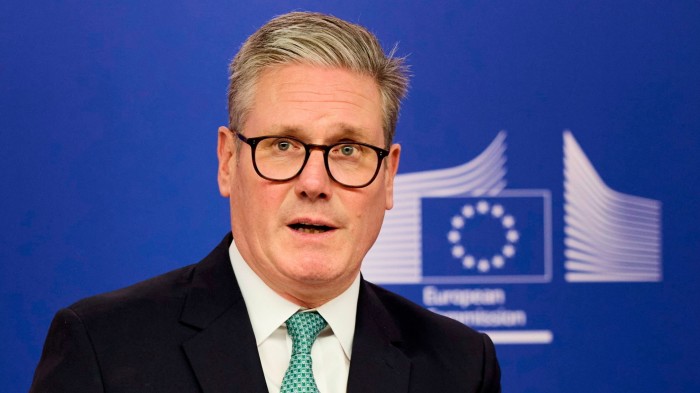Unlock the Editor’s Digest for free
Roula Khalaf, Editor of the FT, selects her favourite stories in this weekly newsletter.
Sir Keir Starmer will hold eleventh-hour talks with EU leaders in Albania this week to finalise a reset of post-Brexit relations, as haggling over the details comes to a head.
With less than a week to go until the EU-UK summit on May 19 in London, both sides remain locked in discussions over fisheries, youth mobility, student access and a new agrifood trade deal, according to people with knowledge of the talks.
Starmer will be in the Albanian capital Tirana on Friday for a summit of the European Political Community, a group of EU and non-EU leaders. It is expected that British officials will use the chance to nail down a final communiqué for next week’s EU meeting.
“Starmer will need to have some bilaterals in Tirana to get this over the line,” said one EU official.
Both sides expect a positive outcome from the London summit, including a security and defence pact being signed. They insist that haggling over the fine points of the communiqué can be managed in time.
“There’s goodwill on both sides,” said one senior EU diplomat. “The idea that Britain is back on the continent is very prevalent.”
But crucial details are still to be finalised, with some tense discussions expected in the coming days.
“The negotiations are in a worse place than a week ago,” said one EU diplomat, adding: “The closer it gets to the deadline, the more the Brits are asking for. It’s not a productive dynamic.”
France and other coastal states want what one EU diplomat described as “long-term certainty” about access to UK fishing waters, with Britain offering to roll over current access for another four or five years.
Some European capitals think that will ultimately be enough for French President Emmanuel Macron, who will be lavished with British pomp and ceremony on a state visit to the UK in July.
Macron and his wife Brigitte will stay at Windsor Castle during a three-day visit, Buckingham Palace announced on Tuesday, in the first visit since Macron became president eight years ago.
As talks entered the final straight, EU officials said the European Commission was still insisting that any deal to streamline trade in agrifoods — a so-called veterinary deal — should be time-limited to match the length of any fisheries agreement.
One British official said the proposal was “a non-starter,” adding: “We want to create certainty for the food and agriculture sector, so we can’t accept any time limit.”
However, UK ministers have repeatedly refused to rule out the idea that Britain would accept “dynamic alignment” with EU rules and a backstop role for the European Court of Justice in any disputes.
Challenged on the issue on Tuesday, European relations minister Nick Thomas-Symonds told MPs his priority was cutting the cost of red tape in the food trade and bringing down supermarket prices for UK consumers.
Both sides are haggling over the description of a future youth mobility scheme in a “Common Understanding” statement, with Britain insisting it must have a strict time limit with a tough cap on numbers.
In the most difficult areas, both sides are likely to fudge the wording of the communiqué, given that details of most of the “reset” will have to be negotiated at a technical level later in the year.
However, both sides want to set the tone for the future talks. The EU is insisting the statement must include a future deal to improve access for EU students to UK universities, either through a mobility deal or a return of Britain to the Erasmus student programme.
Thomas-Symonds has said Britain has “no plans” for a return to Erasmus, but told the Financial Times he did not rule out “sensible proposals” from the EU.
One EU diplomat said a compromise could be worked out in future on how it might work in practice — including on fees charged to EU students — but added: “This is definitely an issue for us. There are more students from India in the UK than from the whole of the EU.”
Additional reporting by Henry Foy in Brussels




